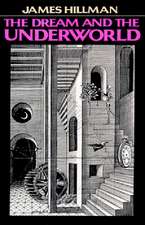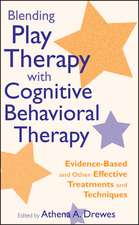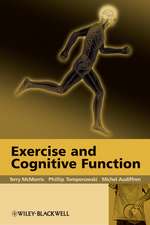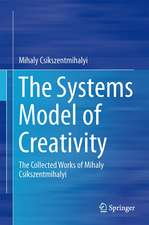Motivation and Action
Autor Heinz Heckhausen Traducere de Peter K. Leppmannen Limba Engleză Paperback – 16 dec 2011
Preț: 418.79 lei
Nou
Puncte Express: 628
Preț estimativ în valută:
80.14€ • 83.16$ • 66.99£
80.14€ • 83.16$ • 66.99£
Carte tipărită la comandă
Livrare economică 11-17 martie
Preluare comenzi: 021 569.72.76
Specificații
ISBN-13: 9783642759635
ISBN-10: 3642759637
Pagini: 528
Ilustrații: XX, 504 p.
Dimensiuni: 193 x 270 x 34 mm
Ediția:Softcover reprint of the original 1st ed. 1991
Editura: Springer Berlin, Heidelberg
Colecția Springer
Locul publicării:Berlin, Heidelberg, Germany
ISBN-10: 3642759637
Pagini: 528
Ilustrații: XX, 504 p.
Dimensiuni: 193 x 270 x 34 mm
Ediția:Softcover reprint of the original 1st ed. 1991
Editura: Springer Berlin, Heidelberg
Colecția Springer
Locul publicării:Berlin, Heidelberg, Germany
Public țintă
ResearchCuprins
1 The Study of Motivation: Issues and Approaches.- Everyday Experiences and Three Issues.- Naive Explanations of Behavior.- An Explanation for Nonoccurring Behavior.- The Consistency Paradox.- Person-Specific Behavior.- Motive as an Explanatory Concept.- Motivation.- Intention Formation and Volition.- Action.- Postaction Phase.- The Chapter in Retrospect.- 2 Historical Trends in Motivation Research.- The Generation of Pioneers.- The Psychology of the Will.- The Instinct Theory Approach.- Personality Theories.- Associationist Theories.- Preview.- 3 Trait Theories of Motivation.- Trait Theories of Motivation: Motives.- Basic Emotions as a Rudimentary Motivation System.- Taxonomic Problems of Motive Classification Systems.- 4 Situational Determinants of Behavior.- Stimulus-Response Association.- Need and Drive.- Drive Theory.- Acquired Drives, Drive as a Strong Stimulus.- Conflict Theory.- Activation Theories.- Toward a Cognitive Appraisal of the Situation.- Emotion as an Outcome of a Cognitive Appraisal.- Appraisal of Threatening Situations.- Cognitive Balance.- Cognitive Dissonance.- Cognitive Appraisal Theories and Motivational Psychology.- 5 Motivation as a Function of Expectancy and Incentive.- Field Theory.- Experimental Contributions of Field Theory.- Tolman’s Analysis of Goal-Directed Behavior.- Expectancy and Incentive Conceptualized in S-R Terms.- More Recent Developments.- Expectancy-Value Theories.- Decision Theory.- Level of Aspiration and the Theory of Resultant Valence.- Atkinson’s Risk-Taking Model.- Rotter’s Social Learning Theory.- Instrumentality Theory.- 6 Volition: Implementation of Intentions.- Ach’s Psychology of the Will.- Three Types of Volition Problems.- Kuhl’s Theory of Action Control.- The Rubicon Model of Action Phases.- 7 Anxiety.-General Anxiety.- Test Anxiety.- 8 Achievement Motivation.- Evolutionary Psychological Perspectives.- Motive Measurement.- Behavioral Correlates of Motive Differences.- Socio-Cultural Motive Indices and Economic Growth.- Sex-Differences and “Fear of Success”.- The Risk-Taking Model as the Dominant Research Orientation.- Choice: Maximal Product of Expectancy and Incentive.- Persistence.- “Inertial Tendency” of the Unfinished.- Performance Outcomes.- Efficiency of Task Performance.- Cumulative Achievement.- Reference Norms for Performance Outcomes.- The Preeminence of Individual Reference Norms within Motivation.- 9 Altruism.- Sociobiological Perspectives.- Research Direction.- Situational Conditions.- Norms.- Evaluative Perspectives for the Donor and Recipient of Aid.- Empathy.- Personality Dispositions.- Towards a Motivational Model of Altruism.- Altruism within an Expectancy-Times-Value Model.- 10 Aggression.- Definitions.- Biological Perspectives.- Norms.- Evolution of the Research Activity.- Situational Factors in Aggressive Behavior.- An Attributional Analysis.- Emotion of Anger and General State of Arousal.- Individual Differences and Preliminary Conceptualization of the Motive.- Aggression as Action Goal: The Catharsis Hypothesis.- 11 Social Bonding: Affiliation Motivation and Intimacy Motivation.- Ontogenetic and Phylogenetic Aspects of Social Bonding.- Affiliation Motivation.- Need Affiliation.- Physiological and Neuroimmunological Correlates.- Questionnaires.- Intimacy Motivation.- 12 Power Motivation.- Motive Base.- Sources of Power.- Power Behavior.- Biological Aspects.- Individual Differences in Power Behavior: Power Motive.- Definitions of Motive.- Combination of Values and Expectancy.- Inhibited Power Motive, Immune System, and Health-RelatedConsequences.- Constellations of Power, Achievement, and Affiliation.- 13 Attribution Theory.- Causal Attribution in the Motivational Process.- Historical Review of the Issues and Related Research Areas.- Fundamental Positions and Models.- Four Broader Issues.- The Motivational Bias Question.- Perspective Discrepancy between Actor and Observer.- Attribution of Responsibility.- 14 Attribution and Achievement Behavior.- Categories of Causal Dimensions.- Constellation of Conditions for Invoking Particular Causal Elements.- Motive-Dependent Differences in Attributions.- Consequences of the Attribution of Success and Failure.- Location Dimension: Self-Evaluative Emotions.- Control Dimension: Evaluation of Others and Self Affect.- Causal Dimensions and Emotions.- Effects on Behavior.- Self-Evaluation a Motivation Principle.- Application: “Attribution Therapy”.- Contributions of Attribution Theory to Achievement Motivation Theory.- 15 Expanded Perspectives.- Intrinsic and Extrinsic Motivation.- An Expanded Motivation Model.- Motivational Shifts: Atkinson and Birch’s “Dynamic Action Model”.- Learned Helplessness.- Self-Concepts.- Name Index.

















